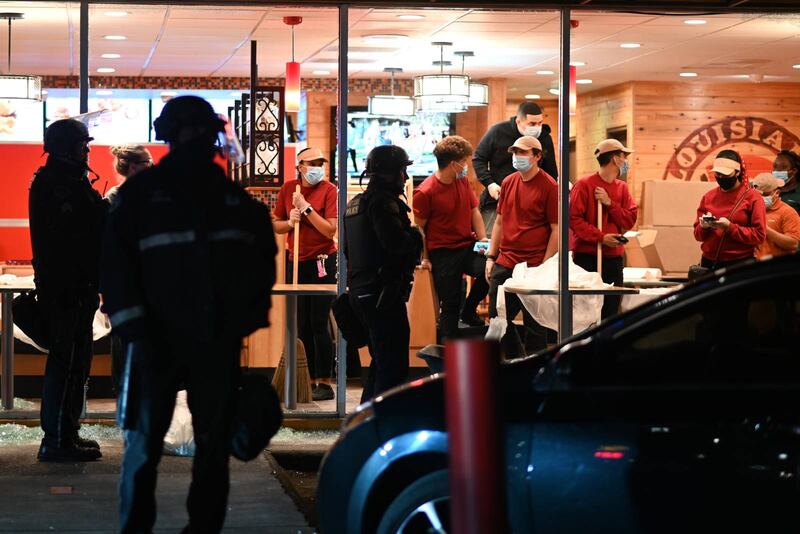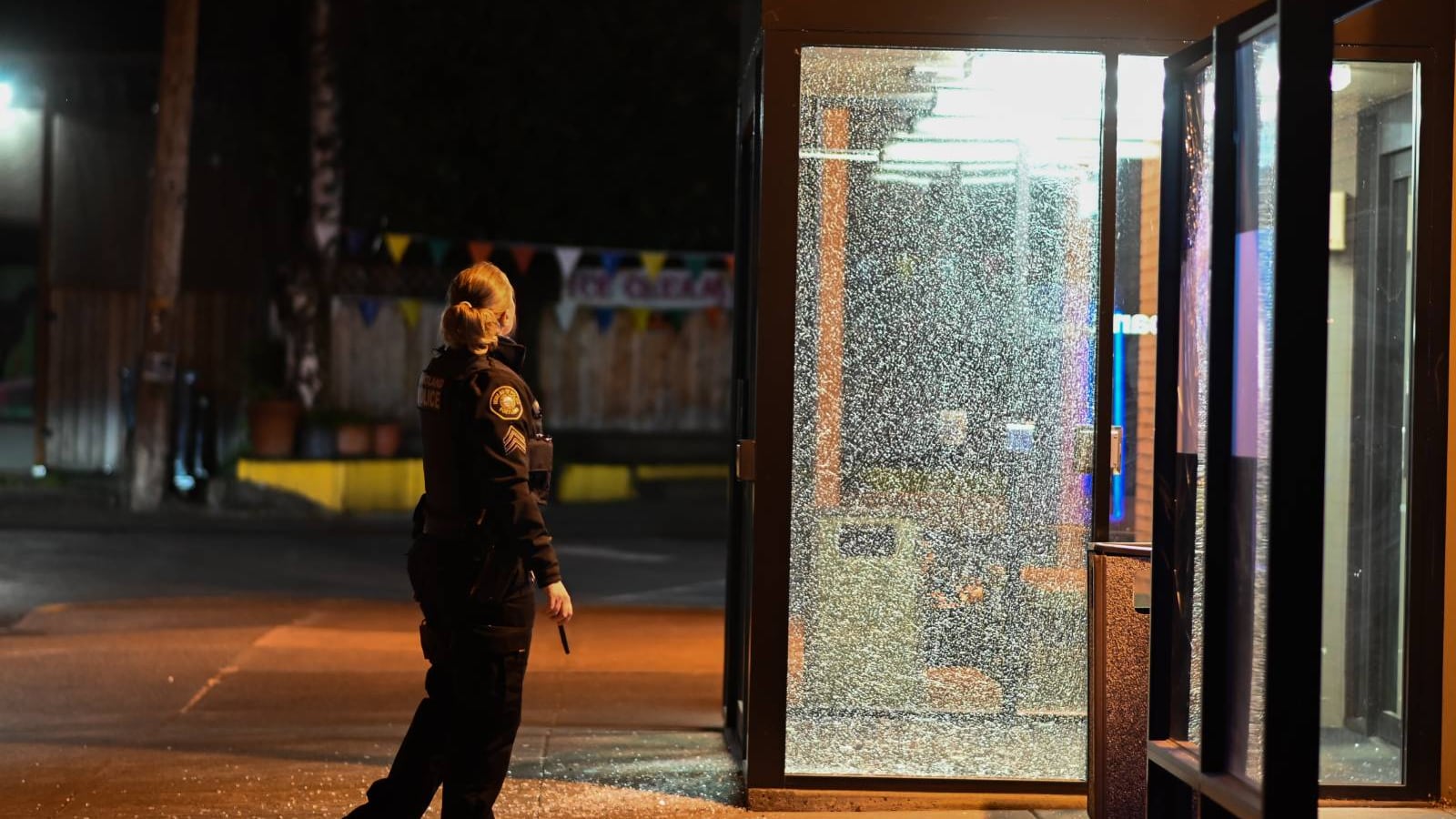Portland Mayor Ted Wheeler on Tuesday declared a state of emergency and said the National Guard is on standby, minutes before former Minneapolis police officer Derek Chauvin was found guilty of the murder of George Floyd.
The mayor’s declaration followed a night of property destruction on Northeast Martin Luther King Jr. Boulevard, where a handful of leftist activists shattered windows in a historically Black neighborhood.
Wheeler urged peace before the Chauvin verdict.
“The trial of Derek Chauvin represents a significant waypoint along the path toward racial justice in America,” Wheeler said during a press conference Tuesday. “It’s my hope that regardless of the jury’s decision, Portlanders will respond with the safety of their neighbors in mind.”
Less than an hour after Wheeler’s announcement, Chauvin was found guilty on all counts for the May 2020 murder of George Floyd. The verdict will likely draw out a smaller crowd of protesters than if Chauvin had been acquitted.
Yet this city has seen renewed property destruction following the Minnesota killing of Daunte Wright last week. Then a Portland police officer fatally shot Robert Delgado, a homeless Portlander, in Lents Park on April 16. Protesters responded by setting dumpsters and construction sites ablaze in downtown.
On Tuesday, the mayor announced a coordinated plan among law enforcement agencies.
“I’d like to thank Gov. Kate Brown for making available the state police to support us and, if necessary, select members of the National Guard who will be standing by to keep our city safe,” Wheeler said. “Those resources are already on the way.”
Wheeler also advised Portlanders to secure dumpsters and A-board signs—which can be lit on fire or used to block off streets—and to leave their lights and security cameras on. The city issued a similar warning about dumpsters in January ahead of potential protests leading up to the inauguration.
Wheeler said law enforcement covering protests will be identifiable by name or ID number, and that they will wear “normal uniforms” except if “violence breaks out.” He added that police will issue warnings to disperse before any use of force occurs, and that use of force is a “last resort.”
The mayor also issued a stern warning to anarchist protesters—a refrain that has become a regular fixture of his press conferences.
“Today, a significant threat to our ability to recover from the COVID-19 pandemic, towards a more equitable and inclusive Portland is the group of 100 or so largely white, self-described anarchists who engage in the criminal destruction of our economy and our confidence,” Wheeler said. “These people are not protesters. They are criminals.”
Commissioner Mingus Mapps backed up Wheeler’s sentiment and also addressed white protesters who plan to destroy property.
“As a Black man in one of the whitest cities in America, I appreciate my white allies,” Mapps said. “But to our white allies out there, before you throw that brick through a museum window, a church window, a restaurant window, please take a moment and have this conversation with at least three people of color: ‘As a person of color, would trashing this Starbucks make your life better?’ I suspect you will discover that acts of vandalism and violence are completely disconnected from the project of helping people of color live freer, safer and more prosperous lives.”
Mapps’ warning followed an April 19 nighttime march by Portland-area anarchists and police abolitionists, who smashed the windows of local businesses and the Boys & Girls Club youth community center located on Martin Luther King Jr. Boulevard.

Nearly 100 people in identity-obscuring “black bloc” clothing met up in Woodlawn Park at dusk. But the Portland Police Bureau’s declaration of an unlawful assembly—delivered approximately 20 seconds after the marchers arrived at PPB’s North Precinct—and their pursuit via bicycle police swiftly dampened the crowd’s numbers.
The shattering of the community center window also divided the crowd. “No!” people in the crowd shouted. “Stop!”
Several members of the crowd grabbed the two window-breakers by their black sweatshirts and pushed them to the edge of the crowd, forcefully shoving them away from the group. However, as the group marched south, some of its members continued to shatter the windows of businesses like Natural Grocers and O’Reilly Auto Parts.
By 10 pm, protesters marched south on Martin Luther King Jr. Boulevard, away from the North Precinct, occasionally smashing windows of businesses, with Portland police bike cops in close pursuit. The crowd hemorrhaged numbers wandering through the neighborhood as it struggled with indecision on where to go or what to do.
Police arrested two people for shattering a bank window.
The flier for the demonstration repeated the phrase “all out,” and seemed to be trying to drum up crowd numbers in response to the Chauvin trial. PPB shared the flier on social media—a newer tactic of the bureau—and advised the crowd of the countywide burn ban in effect via its loudspeaker truck.
The assembly ended with confusion and disagreement. Various participants peeled off onto side streets and the once robust crowd fizzled out, standing on the four separate corners of Northeast Killingsworth Street and Martin Luther King Jr. Boulevard. “Why are we leaving?” some people in the crowd shouted. “Why are we staying?” another section responded.
The shattering of the Boys & Girls Club windows, in particular, seemed to mark a breaking point for several prominent activists in the Black Lives Matter movement, who condemned the damaging of a community center.
More than two-dozen Black activists issued an open letter Tuesday asking black bloc protesters to reconsider their tactics. “For decades, efforts towards Black Liberation have suffered at the hands of both well-meaning allies and predatory opportunists,” the signatories wrote, “and over the last year we have watched as people have profited from and damaged our movement without our consent or approval.”


